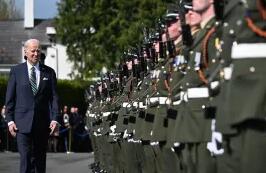United States President Joe Biden has said an investigation into a trove of documents that appeared to be leaked military intelligence was “getting close” while seeking to downplay the significance of the apparent breach.
“I’m not concerned about the leak. I’m concerned that it happened, but there’s nothing contemporaneous that I’m aware of that is of great consequence,” Biden told reporters on Thursday in Dublin while on a trip to Ireland and Northern Ireland.
He said a “full-blown” investigation was under way by the Department of Defense and the Department of Justice into the documents, which began to appear online in early March – if not earlier – and appeared to contain classified information relating to US assessments of the war in Ukraine as well as intelligence on close US allies.
“We’re getting close,” Biden said of the investigation. “But I don’t have an answer.”
US officials have repeatedly acknowledged the leak, which began to be reported widely in US media last week, but have expressed caution about the authenticity of the documents and have repeatedly warned they might be part of misinformation campaigns.
There’s no clear accounting of how many apparently leaked documents are circulating. Estimates range from at least 50 to hundreds
The man believed to be behind the leaks got the documents from his work on a “military base”, The Washington Post reported Wednesday, citing interviews with two people who were in an online group with him. The report said the man was known as “OG” and had been sharing information since last year, at first typing out accounts of classified documents and posting the text. He later began photographing the documents and uploading the images, the Post reported.
On Thursday, the New York Times identified the man as 21-year-old Jack Teixeira, a member of the intelligence wing of the Massachusetts Air National Guard. The newspaper reported two anonymous officials confirmed investigators want to speak with Teixeira. NBC News also reported that two officials identified Teixeira as the suspected leaker.
An investigation by Bellingcat, an open source investigative site, has said photos of the documents appeared to have first been posted on a server on Discord, an online platform used predominantly by gamers.
Pentagon officials have said the documents “appear to contain sensitive and highly classified material”. At least some resemble the daily intelligence updates given to top US military officials.
While still unverified, the documents have generated responses to their apparent intelligence from several governments.
Some appear to show the US giving a grim assessment for Ukraine in its ongoing war against invading Russian forces, saying its air defences are facing looming shortages, that the war is likely to stretch beyond 2023 and casualties on both sides are much higher than publicly known. One document reportedly indicated that Western special forces were active in Ukraine at the beginning of the year.
Another document, obtained by The Washington Post appears to show that Egypt planned to supply Russia with rockets and munitions. The document suggested President Abdel Fattah el-Sisi had sought to keep the plan secret to avoid angering Western allies, including the US, which provides Egypt with $1.3bn in military aid annually. A senior Egyptian official has said the claims have “no basis in truth”.
Another purported highly classified Pentagon document reveals Russian operatives were building a closer relationship with the United Arab Emirates, which is home to important US military installations. The UAE has called the allegations “categorically false”.
Other leaks contained allegations that South Korean leaders were hesitant to ship artillery shells to Ukraine and that Israel’s Mossad spy service opposed Prime Minister Benjamin Netanyahu’s proposed overhaul of the judiciary. Both governments denied those allegations.
On Thursday, White House Press Secretary Karine Jean-Pierre called on social media companies to “avoid facilitating the circulation of material detrimental to public safety and national security”.“We do believe that social media companies have a responsibility to their users and the country to manage the private sector infrastructure that they create and then operate,” she said.

